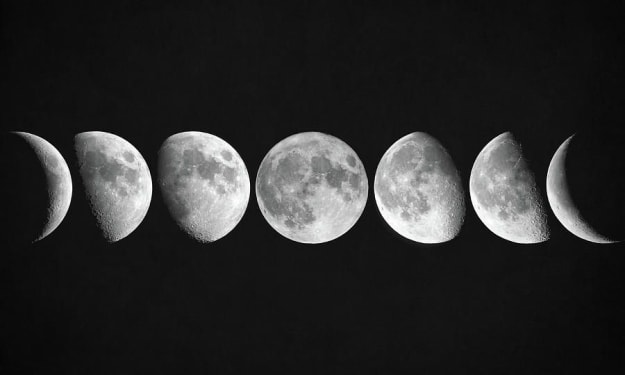Implosion
She can almost feel the circle of life shattering. She can almost hear the tension in words unspoken.

Implosion
Originally published in Projector Magazine and Within/Without These Walls (AndAlso Books)
***
The man grips a black briefcase in his right hand. His left hand itches at his neck and face.
No one sees his scratching—not the guards patrolling the glowing halls, not the supervisors whose eyes have gone blank monitoring blinding, soundless surveillance. Not even the woman who sits beside him in the departure terminal, clutching a baby in stiff arms.
His eyes rove the room, sometimes snagging on a clock hanging on the adjacent wall, sometimes on a girl dressed in black whose inquisitive gaze follows the movements of passersby. Her eyes find his in the instant before he turns away—enough for him to know that she is not the one.
His hand creeps up to his jaw, fingers already curled.
*
Bleached blonde hair; bleached white skin. Heels on tile.
Rich shoppers and greedy salesmen. Hands clutching boarding passes and mobile phones like sustenance.
A girl clad in black, weaving lines of ink across the pages of the notebook resting on her knees. An ageless woman with frazzled hair holding a silent baby in limp arms. A man carrying a briefcase: the embodiment of cold, impersonal business.
A sterile, pristine airport.
The girl in black considers the teary partings, the typing fingers and talking mouths, the ends morphing into beginnings. Her bare calves bristle with goosebumps; the seat beneath her is almost as cold as the synthetic indoor air. Pale yellow stuffing creeps through the seams and tickles her skin.
Her father sits beside her, oblivious to her contemplation. He is the only person she loves beyond doubt, the only person to whom she would reveal the thoughts drifting through her brain.
She imagines touching the floor-to-ceiling windows overlooking the parked planes outside, the cracks fissuring from her fingers, the sound of the glass splintering, crumpling in on itself, crashing to the floor in a harmony that reminds her of a blooming fire, the waning sunlight shifting and flickering over the tinted shards that will litter the floor.
She can almost feel the circle of life shattering. She can almost hear the tension in words unspoken.
*
The briefcase sways back and forth as the man slips through the milling people. They hover by café stalls, worrying about the price of coffee, the number of calories in a cinnamon bun, the taste of a day-old sandwich. In less than an hour, none of this will matter.
He passes the girl in black and in his periphery sees her raise her head. Her curious gaze follows him to the end of the terminal.
The case weighs down his right shoulder. Sweat pools in his palm where it curls around the handle, but he does not adjust his grip. He continues patrolling, mimicking the guards, occasionally glancing at his watch, at the clocks on the walls, at the time ticking over on the electronic timetables hanging from the ceiling. Occasionally scratching at his neck, his face.
*
The baby’s soft, curly hair grazes the woman’s chin. Hair so young it hasn’t developed a distinguishable colour.
Her nails dig into the baby’s delicate skin, but she doesn’t adjust her grip, doesn’t notice the half-moon imprints marring the light pink surface.
‘Excuse me, ma’am.’
She looks up; her reflexes are more engrained than her manners are.
The woman speaking wears a crisp, clean uniform that marks her as a flight attendant. Her lips are painted a deep red, deeper than the imprints left in the baby’s skin. The lipstick extends past the edges of her lips, which are curled upwards into a wavering smile.
‘Here. Please.’ And she holds out the baby to the flight attendant, with its wispy hair and claw marks etched into delicate plush skin. She doesn’t look at it.
She has never looked into its eyes. She will never allow herself to wonder what colour they are—but somehow, even though she has never looked, she knows its eyes are the colour of the sea. Like the sea that stretched out beyond the room in which it was born; like the sea that lived inside its father; like the one that used to toss up storms in her own eyes. Like the sea that now lay still and flat in her mind.
The attendant stares at her. So the woman lets go of the baby and walks away, past a staring girl dressed in black, and bumps into a man carrying a briefcase. She rights herself but doesn’t look back, not at the man or the girl or the baby or the attendant, whose voice rises above the morning cacophony, taut but steady.
She must have caught the baby.
*
The man is beginning to think the plan has been called off.
He did not expect the airport worker to succeed in delivering the briefcase to him. He did not imagine the plan would proceed to this point, that he would be responsible for such a paramount task, that any of this would really happen.
The skin above his collar is chafed and red raw. His forehead is damp, but he cannot risk wiping it.
They are watching; they are always, always watching. This is the mantra that loops over and over inside of his brain.
But the desire to forget, to abandon whatever foolishness spurred him into this, seeps through the crevices in his discipline.
*
The flight attendant holds the baby as far from her body as she can. She casts her eyes about again, but the woman is gone. Passengers gawp at the attendant from their seats, mouths propped open. She looks back to the baby.
‘Okay,’ she says, her voice thin and breathy from running.
She readjusts her grip and holds the baby against her, rocking him as she walks back to her post, as gentle as ripples in a bathtub.
The passengers return their eyes to the mobile devices in their hands, their laps. A few still watch her, including a teenager wearing black who leans away from the attendant as she breezes past.
She recalls the words her father left her with before her first trip to Australia. He told her that nothing ever happened down there, but she thought she’d like the bottled effervescence, anyway.
And that’s when the smell slinks through the boarding corridor, past the desks and computers, between chair legs and human legs, and into the departure gate.
*
The man drifts by a young uniformed woman toting a baby in delicate arms. It lolls along with her movements, flaccid and oblivious to whatever forced affection she projects.
For the first time, the man asks himself if he is really going to do this.
The ticking of all of the clocks around him fills his head until all other sound is devoured.
*
A snake weaves through the rows of chairs, the scales made up of human beings.
The wait has begun. Apprehension hangs over the clump of bodies, insidious and choking.
A breathless woman in a navy blue pencil skirt hurries by, weighed down by a baby. The man with the briefcase is weighed down, too. The girl considers pointing him out to her father, but she says nothing and continues regarding the man as he stands before a clock mounted on the wall.
An insistent smell pervades the room, slithering between legs, winding itself into hair, seeping down corridors and along tiled floors. It rises and rises and she can almost hear it.
*
The man is surrounded by gawking faces—clock faces. Less than a minute remains.
His hand reaches up, but his nails do not meet skin. He stares at the clocks, his mind traveling to a time when his father spoke to him in a voice smudged with bitter disappointment, eyes seething with disgust, as if he cared.
The people in the airport no longer exist. The man is beginning to see no point, no point to any of this.
He raises both of his hands to his face, no longer caring about the suspicion or the attention he could draw to himself, and he wipes his forehead and scratches his cheeks and rakes his nails over his nose and down his sideburns. His fingers reach down into his collar and scratch the skin on his neck all the way down to the top of his chest.
Perspiration floods the gaps under his nails but he doesn’t care, doesn’t care, doesn’t care—because no time is left, and nothing has happened, and he is about to exhale with relief when the inside of his mind implodes and the shrapnel that remains of it bursts into shards that embed themselves in his brain.
He does not have time to notice that his briefcase has been missing for some time, or to feel relief or horror or guilt or ecstasy because
he
is
gone.
*
The woman hears the implosion of the building. The crash of the ceiling collapsing. The rush of air being vacuumed from the space. The catch of the fuselage. The silence before the screams.
She hears but doesn’t process, and so she keeps walking. Not hurriedly. Nor leisurely. Just walking. Just going. Just leaving.
*
The man’s face looks no different in death than it did in life. His limbs are mangled and the torn skin of his neck hangs down in rubbery flaps, but his face is unblemished. His eyes are devoid of emotion, of anything at all. His fingers are curled in mid-itch.
In his last moment of vision, he saw the girl in black reaching for a bloodied man with a gaping wound in his neck. His arm was stretched out towards her, too, but their hands never connected because his forearm had been replaced by a ragged lump of exposed flesh and bone.
The girl’s inquisitive gaze was replaced by a shredded mask of anguish. The man saw—or perhaps imagined—her eyes flick to his before his vision was doused in darkness.
No one will close the eyelids. But they will know who he is, what he has been a part of.
*
The flight attendant was thrown against the ground, bones torn through muscle, her starched uniform minced by flying debris, skin ripped by the impact of the implosion, brain mashed against skull, hair pulled from scalp as the tender caress of flames singed it away.
Thoughts of the baby left her mind as the noise rose and the world cracked like a window does before breaking.
When the fire began to bloom, she saw the twinkling eyes of her younger sister driving a car for the first time. She heard the chink of laughter like a teaspoon tapping a glass—the laugh that belonged to the woman she was to marry in three weeks. She smelled the freesias her father had gifted her the night before her first flight as an attendant almost a year ago. She felt his crinkled skin under her fingers as he lay in the hospital bed a few weeks later, dying, telling her she would make it further than he did.
Now she lies among the debris, a broken porcelain doll, and the baby is nowhere in sight.
About the Creator
Svetlana Sterlin
Svetlana Sterlin is based in Brisbane, Australia, where she writes prose, poetry, and screenplays. The founding editor of swim meet lit mag, she also edits with Voiceworks.
More from Svetlana: https://linktr.ee/svetlanasterlin






Comments
There are no comments for this story
Be the first to respond and start the conversation.